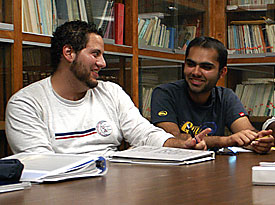 |
|
MALLORY LORING/Arizona Daily Wildcat
|
Electrical engineering senior Faisal El-Azzouzi, left, and MIS junior Umair Malik discuss how to broaden Muslim acceptance and understanding on campus during a meeting of the Muslim Student Association.
|
|
|
By Cara O'Connor
Arizona Daily Wildcat
Thursday September 11, 2003
Madiha Raina recalls being followed between classes and taunted following the terrorist attacks of Sept. 11, 2001.
"People would say, 'Go back where you came from,'" the physiology junior said.
The harassment has since ceased, but challenges for Arabs in America still exist.
Since 9/11, the UA has seen a sharp decrease in the number of Middle Eastern students arriving from abroad, said Kirk Simmons, executive director of the Division of International Student Affairs.
He said that while he used to see about 40 to 60 students from Middle Eastern countries during each international student orientation, this year he only saw about six students.
The total enrollment of international students has dropped about five percent, from 3,000 to 2,850, said Rick Kroc, director of assessment and enrollment research.
Simmons said he sees this drop as a direct result of laws associated with the Department of Homeland Security.
International students entering the United States are required to have their information entered in the Student and Exchange Visitor Information System.
As of Aug. 1, 2003, all new international students and some teachers have been required to have an in-person interview with a U.S. consular before they have been granted visas.
"They are giving up because of the bureaucracy involved in getting their visas," he said. "The university can do nothing as long as the current laws are in effect."
Simmons said he thinks that delays caused by the new laws are unreasonable.
"They are simply coming to get an education and they are certainly not terrorists," Simmons said.
Implications of the Patriot Act have also deterred many foreigners from coming into the United States, said visiting scholar Ahmad Mousalli, of the American University of Beirut in Lebanon.
"The U.S. can arrest any foreigners without due process," he said. "Most Arabs and Muslims are suspect."
This is part of the problem why people are very hesitant to come here, he added.
Mousalli thinks that the United States has detained foreigners without reason just to pacify the American public.
"The Unites States has to show that they are doing things for the safety of this country," he said.
Nearly two years ago, the violence toward the Arab community was so prevalent that about 40 students from the Gulf area went home.
Their families said that it was not safe for them to live in this country, Raina said.
"9/11 was not only an attack on the U.S. It also did a lot of damage to the image of Islam in this country because many people wrongly blamed it on the religion," said Asad Iqbal, a philosophy graduate student and president of the Muslim Student Association.
Apart from violence and verbal assaults, Raina remembers a change in the public's attitude toward her and other Arab people.
"People at stores would give me weird looks," she said. "They would be more careful around me."
Michael Burdine, director of the Tucson Islamic Center, said that some Muslim women ÷ especially those who dressed more conservatively ÷ avoided leaving their homes for up to three weeks after the harassment since the attacks began.
Burdine also said that someone tried to run his friend's car off the road and later through a rock through his car window. At the time, his friend was the director of the Islamic Center at Tucson.
Threats and hostilities were not limited to practicing Muslims, but were also directed toward Arab Christians.
Nesreen Khashan, a Near Eastern studies graduate student, said that her parent's church in San Jose, Calif., a Christian Arab church, burned down shortly after the terrorist attacks.
The police said it was arson, Khashan said.
Khashan said that she felt embarrassed by the attention she received because of her Arab background.
"Even though I am as American as people whose descendants go back many generations I remember feeling awkward," she said. "This was just a group of fanatics that didn't represent my community or me."
About a year ago some of Raina's friends were verbally assaulted by strangers as they walked home from classes late at night, Raina said.
She has not heard of any harassment since then.
UAPD spokesman Sgt. Eugene Mejia said that he does not know of any harassment claims filed with the police department by Muslim people in the past year.
Still, the Muslim community is taking precautions.
He said that the anniversary of the event raises some concerns about safety and he has worked with the university and Tucson police departments to increase security at the mosque today.
"Things seem to be pretty quiet and I hope they stay that way," Burdine said.
"We will have additional officers on the streets," Mejia said. "As with any anniversary of a terrorist attack, our department and the nation prepares for similar attacks."
